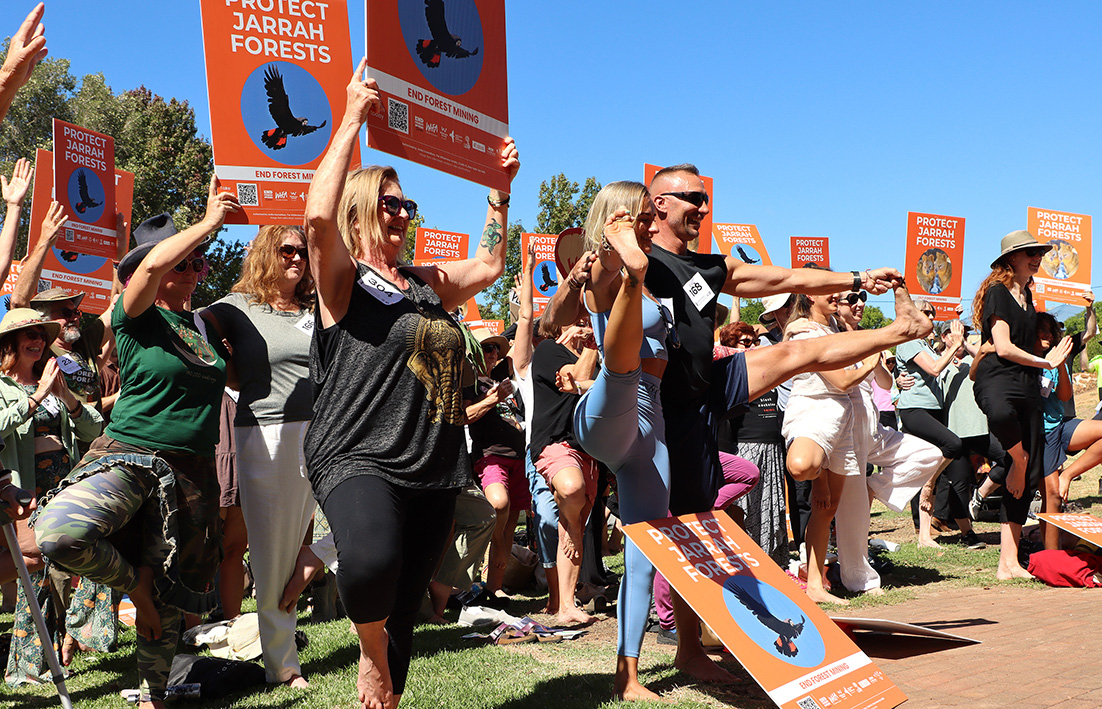
LAST Saturday morning, people gathered for the Unite for the Jarrah event at Kalamunda’s Stirk Park to raise awareness about the threatened Northern Jarrah Forest and at the same time, smash a world record.
The Wilderness Society WA (WSWA) tallied more than 400 people in attendance at the event with some joining virtually from New Zealand and Thailand.
WSWA senior campaigner Jenita Enevoldsen said over the past 60 years there had been bauxite mining which started off at around 1ha per year but now, Alcoa was seeking to expand by 7500ha.
“The jarrah forest is imminently under threat,” she said.
“So, we wanted to raise awareness about that.”
Miss Enevoldsen said the event organisers at WSWA wanted to incorporate mental health and wellbeing to reflect the feeling of relaxation and calmness associated with being in the forest.
“We thought a great connection is to actually do some yoga in a park and see if we can get as many individuals doing the tree pose as possible, at the same time, simultaneously.
“And if we could do that, we might be able to break the world record.”
The current record is 114 participants, according to the Worldwide Book of Records.
Although WSWA is still waiting for a committee to verify numbers, Miss Enevoldsen said she is confident they have at least tripled the current record.
“Standing together in the tree pose was more than a yoga world record,” Miss Enevoldsen said.
“It was a powerful symbol of unity for the Northern Jarrah Forest.
“This forest is a globally significant ecosystem, and yet it’s disappearing before our eyes.”
Alcoa’s restoration of the jarrah forest was reviewed in a paper published in the scientific journal Restoration Ecology.
The researchers concluded, “The 2-star rating of restoration against Alcoa’s 4-star medium-term goal and poor to declining trajectory means that restoration areas do not return to a state similar to the native reference ecosystem, improve over longer timeframes, nor show sustained improved outcomes from adaptive management processes.”
Miss Enevoldsen said WSWA is calling on WA decision makers to end forest mining and deliver commitments for a network of protected areas across the state.
“What we’re really seeking is for the federal government to deliver on their commitment to prioritise nature,” she said.
“What we’re seeing is because decision making for mining happens on a state level, the Western Australian government is the key decision maker.
“But when threatened species of national environmental significance are going to be affected, that’s when the federal government become decision makers.”
According to the Department of Climate Change, Energy, the Environment and Water (DCCEEW), Australia’s environment is protected under the Environment Protection and Biodiversity Conservation (EPBC) Act.
“The EPBC Act requires actions that are likely to have a significant impact on matters of national environmental significance to be approved before they can proceed,” a DPCCEEW spokesperson said.
Meanwhile, last Tuesday Liberal Senator Michaelia Cash accused Prime Minister Anthony Albanese of misleading Western Australians after Labor recommitted to nature positive laws.
Senator Cash said the laws would impact mining and agricultural sectors as well as WA families.
“It is estimated that Mr Albanese’s nature positive, mining negative laws will increase the costs of housing by 10.6 per cent and increase electricity prices by 38 per cent. This would be a disaster for Western Australian families during a cost-of-living crisis,” Senator Cash said.